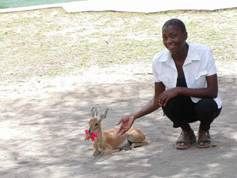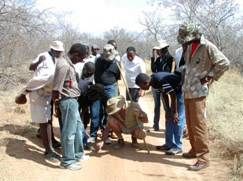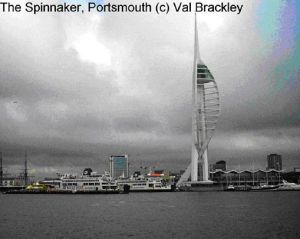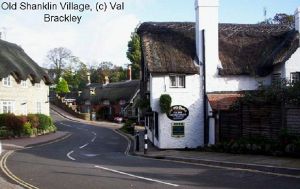It is easy to make the mistake of thinking that those who live in what we would consider a hut are lazy and stupid. Fortunately, that is often far from the truth. In fact, they are often very resourceful.
My first experience with the ingenuity of Mexicans was during our year of volunteer work in Villahermosa in the state of Tabasco. We were driving a Chevy Nova and it was usually pretty reliable for us. However, Mexican gas disagreed with it and I soon had some trouble with the carburettor.
A friend of mine who worked in the hospital laboratory took me to a nearby repair shop and helped me get a mechanic to help me out. He followed us back to the hospital and pulled the carburettor out of my car. He then headed back to his shop.
Having heard that it was best to keep a close eye on anyone working on your car, I followed him. Over the next half hour, I watched him completely disassemble the carburettor, clean it with solvent, hand make new gaskets and put it back in my car. The car then ran like new.
So, within a half hour, I had a rebuilt carburettor back in my car. I was pretty impressed. I was even more impressed when he said, “Sorry it took so long, but I have never worked on a Chevrolet before.”
A professor from one of the Universities in Texas had a similar experience. He taught Mexican archaeology and often toured remote areas in a jeep. We met him when we were camped on the beach on one of our trips to Tulum.
He told us that one time he was travelling up in the mountains in a remote area north of Mexico City. The road was pretty rough and he hit a rock. The rock totally destroyed his oil pan. Without the oil pan, the jeep was useless and he could go nowhere.
After waiting about 4 hours a farmer came by with a mule and was able to pull the jeep into a town a few miles away.
Now every little town in Mexico has a small mechanic shop that is a combination repair, tire retread and blacksmith shop. He went over there and explained his problem. After asking if the shop owner could order him a new oil pan and install it, the mechanic replied, “Sure, no problem. It should be here within a couple of months.”
He questioned the mechanic if there was any other solution. The Mexican replied, “Come back in three days.”
So, the professor found a lady that would put him up for a few nights. He then got a chair in the yard and watched what the mechanic did. He watched with interest as the owner went to each house in the village and collected any scrap metal or tin cans that they had.
The mechanic then went back to his shop and started working the metal. Over the next few days, he melted the metal down and poured it out forming a sheet of metal. He then pounded it and cut it into the proper shape, made a gasket and fitted it onto the bottom of the jeep.
The professor then told me that he drove the jeep on many trips after that and the handmade oil pan never leaked a drop!
As you can imagine, I have the highest regard for these underrated Mexican mechanics. While caution is always in order dealing with anyone working on your car, you should be able to find someone with excellent skills to work on any vehicle that has problems while driving in Mexico.
About the author: Ron McCluskey and his wife Larose are both physicians. Between the two of them they have done volunteer medical work on all continents except Antarctica. Because caring for people’s physical needs opens up singular opportunities, they have been able to travel where most others could not. You may find more of their travel experiences at http://ilovetravelvacations.com

 As the name suggests, Daktari is a wildlife orphanage that takes in injured, orphaned, or animals in general that for some reason can not be rehabilitated into the wild. People are educated in animal welfare, the environment and nature conservation by being part of teams which provide the nursing for the animals.
As the name suggests, Daktari is a wildlife orphanage that takes in injured, orphaned, or animals in general that for some reason can not be rehabilitated into the wild. People are educated in animal welfare, the environment and nature conservation by being part of teams which provide the nursing for the animals. Daktari particularly targets underprivileged children from the surrounding rural areas. They are educated in the environment, life skills, and the care of the animals. Sadly, people from the local community suffer from the lack of access to their rich South African natural heritage even though they live right next to private game reserves. This has contributed to the high degree of poaching and environmental abuse in the area. We feel that by generating compassion and understanding, people will care for the environment.
Daktari particularly targets underprivileged children from the surrounding rural areas. They are educated in the environment, life skills, and the care of the animals. Sadly, people from the local community suffer from the lack of access to their rich South African natural heritage even though they live right next to private game reserves. This has contributed to the high degree of poaching and environmental abuse in the area. We feel that by generating compassion and understanding, people will care for the environment. Daktari aims at inviting groups of underprivileged children to stay at the reserve, where they can learn about wildlife, teamwork, responsibility, have a hands-on experience, life skills, and by doing so, develop compassion towards animals. Unfortunately, many children end up unemployed after finishing high School. We expect that the education the children receive here will help them develop their skills and thus provide them with more work opportunities later in life, such as in the eco-tourism industry.
Daktari aims at inviting groups of underprivileged children to stay at the reserve, where they can learn about wildlife, teamwork, responsibility, have a hands-on experience, life skills, and by doing so, develop compassion towards animals. Unfortunately, many children end up unemployed after finishing high School. We expect that the education the children receive here will help them develop their skills and thus provide them with more work opportunities later in life, such as in the eco-tourism industry.
 which has been restored to 1860’s condition and the Mary Rose Museum, which is the only 16th century warship on display in the world. It was built for Henry VIIII and sank in 1545. There are also interesting harbour cruises available.
which has been restored to 1860’s condition and the Mary Rose Museum, which is the only 16th century warship on display in the world. It was built for Henry VIIII and sank in 1545. There are also interesting harbour cruises available.